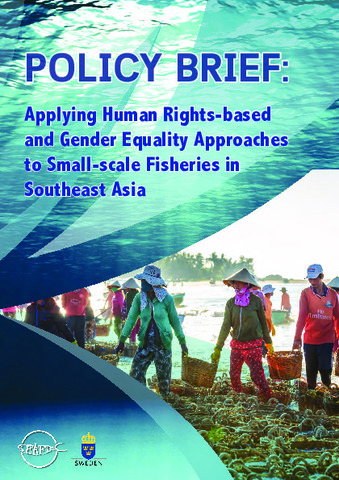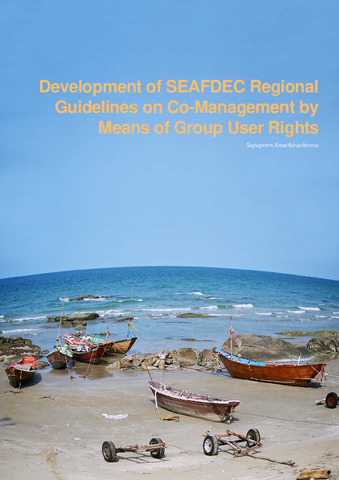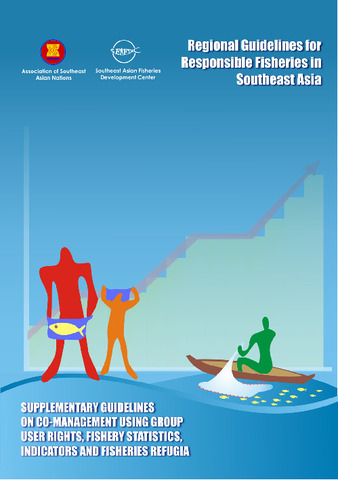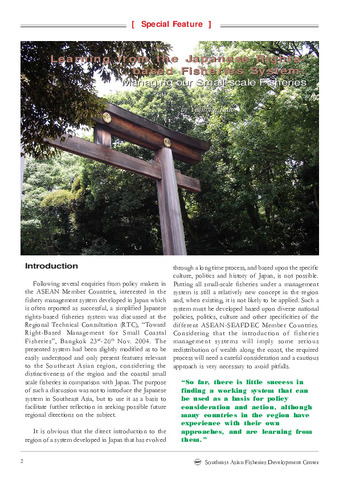Policy Brief: Applying human rights-based and gender equality approaches to small-scale fisheries in Southeast Asia
Share
អរូបី
Small-scale fisheries in Southeast Asia and around the world play an important role in food security, poverty eradication, equitable development and local resource utilization. In spite of this importance, the sub-sector and those depending on it for their livelihoods tend to be marginalized from decision-making processes, which impact their access to and management of the resources that they depend directly. When access to fishery resources is threatened, the potential of small-scale fisheries to contribute to human well-being and environmental sustainability is also put at risk. In response, and to provide guidance on small-scale fisheries governance and development, the Voluntary Guidelines for Securing Sustainable Small-Scale Fisheries in the Context of Food Security and Poverty Eradication (SSF Guidelines), were developed through a global, concerted effort and then endorsed at the 31st Session of the FAO Committee on Fisheries (COFI) in 2014. The SSF Guidelines take a holistic perspective of small-scale fisheries livelihoods and draw attention to the need to secure rights and access to resources within the broader framework of human rights-based and gender equality approaches to small-scale fisheries development.
Considering the importance of small-scale fisheries throughout the region, the ASEAN and SEAFDEC Member Countries take a great interest in the SSF Guidelines and have embarked on a process to provide advice on the application of the SSF Guidelines to support sustainable small-scale fisheries in Southeast Asia. However, some of the basic concepts of the SSF Guidelines still need to be clarified further and the SEAFDEC Council in April 2017 stated that “the details on human rights-based and gender approaches still remain unclear, thus it is necessary that the region should also focus on the specific issues on human rights”. Against this background, a workshop was convened in Bangkok, Thailand on 26-28 September 2017 to review, discuss, and clarify the basic elements that need considered to support “human rights-based and gender-equitable” small-scale fisheries. This policy brief constitutes a condensed version of the outcomes of the workshop with regard to the applicability, relevance, and importance of human rights-based and gender equality approaches to promote secure and sustainable small-scale fisheries that support food security and poverty eradication in the countries of the region.
Suggested Citation
SEAFDEC. (2018). Policy Brief: Applying human rights-based and gender equality approaches to small-scale fisheries in Southeast Asia. Bangkok, Thailand: Secretariat, Southeast Asian Fisheries Development Center.
ប្រធានបទ
បណ្តុំបណ្តុំ
Related items
Showing items related by title, author, creator and subject.
-
Development of SEAFDEC regional guidelines on co-management by means of group user rights
Anuchiracheeva, Supaporn (Secretariat, Southeast Asian Fisheries Development Center, 2005)In the Southeast Asian context, small-scale fisheries, which involve either full-time or part-time activities in inland and inshore waters, constitute the major part of the sector. With a view to developing and improving ... -
Regional guidelines for responsible fisheries in Southeast Asia: Supplementary guidelines on co-management using group user rights, fishery statistics, indicators and fisheries refugia
Association of Southeast Asian Nations; Southeast Asian Fisheries Development Center (Secretariat, Southeast Asian Fisheries Development Center, 2006-03)This 84-page Supplementary Guidelines further elaborates issues contained in the Regional Guidelines for Responsible Fisheries Management, i.e. Co-Management Using Group User Rights, Fishery Statistics, Indicators and ... -
Learning from the Japanese rights-based fisheries system: Managing our small-scale fisheries
Yasuhisa, Kato (Secretariat, Southeast Asian Fisheries Development Center, 2004)A discussion is presented on a rights-based fishery management system developed in Japan, considering its application to the Southeast Asian region. Some features of this system may provide guidance to fisheries policy ...





